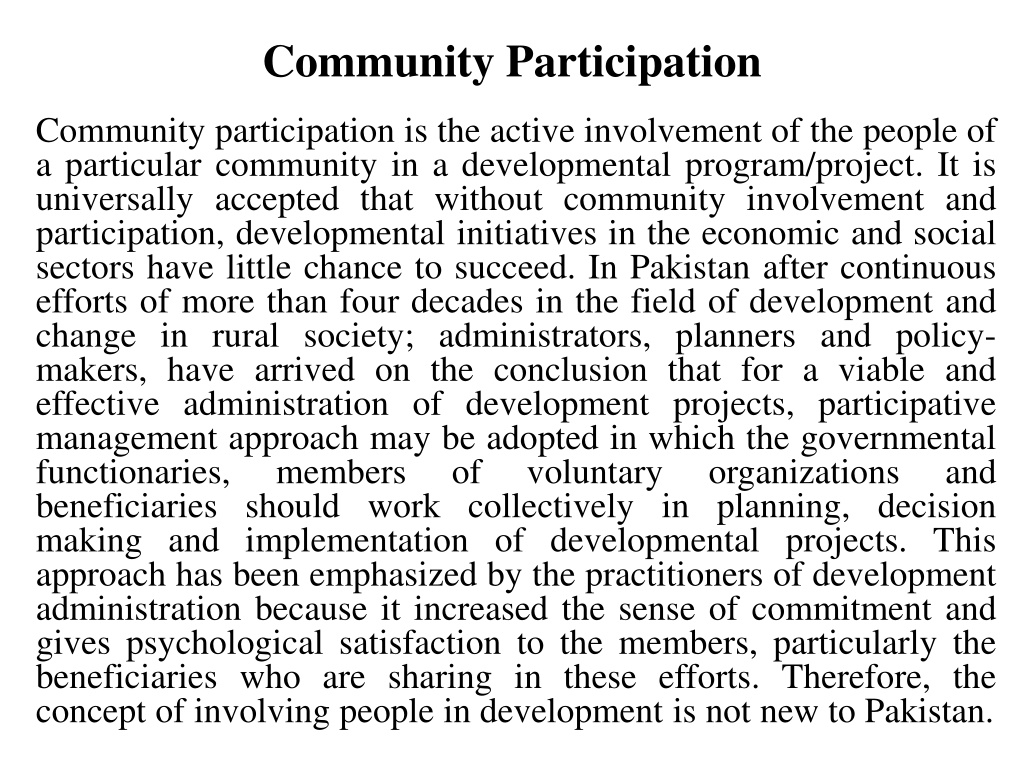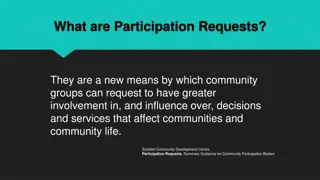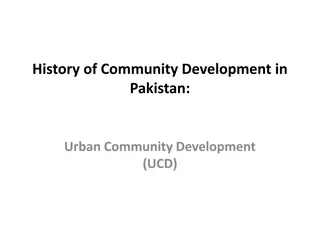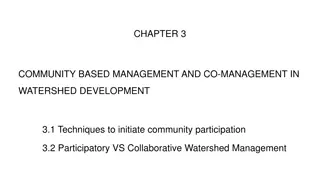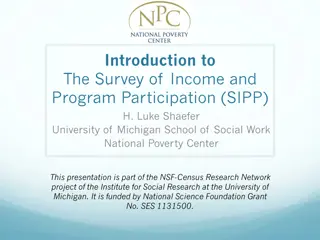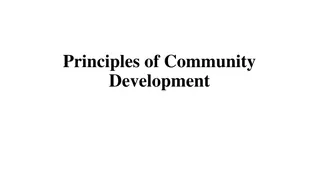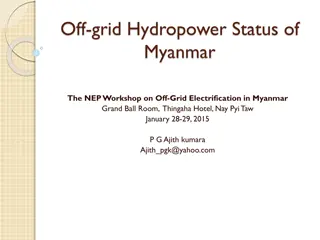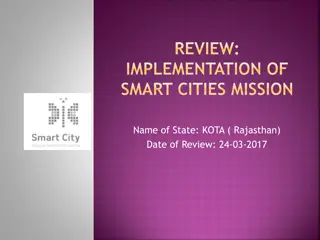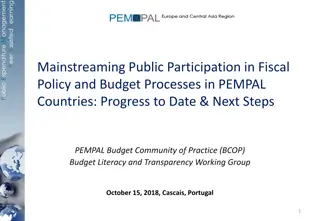Importance of Community Participation in Development Projects
Active involvement of community members is crucial for the success of developmental programs. In Pakistan, a participative management approach involving government officials and beneficiaries has been recognized as vital for effective project implementation. Various definitions and types of community participation are highlighted to emphasize the significance of empowering local communities in planning, managing, and benefiting from development initiatives.
Uploaded on Oct 04, 2024 | 0 Views
Download Presentation

Please find below an Image/Link to download the presentation.
The content on the website is provided AS IS for your information and personal use only. It may not be sold, licensed, or shared on other websites without obtaining consent from the author. Download presentation by click this link. If you encounter any issues during the download, it is possible that the publisher has removed the file from their server.
E N D
Presentation Transcript
Community Participation Community participation is the active involvement of the people of a particular community in a developmental program/project. It is universally accepted that without community involvement and participation, developmental initiatives in the economic and social sectors have little chance to succeed. In Pakistan after continuous efforts of more than four decades in the field of development and change in rural society; administrators, planners and policy- makers, have arrived on the conclusion that for a viable and effective administration of development projects, participative management approach may be adopted in which the governmental functionaries, members of beneficiaries should work collectively in planning, decision making and implementation of developmental projects. This approach has been emphasized by the practitioners of development administration because it increased the sense of commitment and gives psychological satisfaction to the members, particularly the beneficiaries who are sharing in these efforts. Therefore, the concept of involving people in development is not new to Pakistan. voluntary organizations and
Definition of Community Participation 1. A World Bank study defined community participation as an active process by which beneficiary/client groups influence direction and execution of a development project with a view to enhancing their well being in terms of income, personal growth, self-reliance or other values they cherish. 2. Peter Oakley opines that community participation means to sensitize people and thus to increase the receptivity and ability of rural people to respond to development programmes and as well as to encourage local initiative. 3. Srinivasan suggests that community participation is a process of empowerment where villagers, regardless of their socio-economic and literacy levels, can increasingly take responsibility themselves to plan, manage, control and access collective actions, including improving their own capital for the sustainability and further development of needed services.
Types of Participation Participation in an activity individually or collectively is the interest that has been taken and transformed into action. Sociologically speaking there are different types of participation. In groups, organizations, formal or informal collective structures, Dr. Meister gave five types of participation. 1. Spontaneous participation 2. Imposed participation 3. Defacto participation 4. Voluntary participation 5. Induced/persuaded participation
Types of Participation 1. Spontaneous Participation Spontaneous participation is instant, acting suddenly without any thought impression of being impulsive. There is no rational organization behind it. It is objective. It is more emotional rather than rational charge because in this type of participation, personal well and desire involved. There is no rule, no method, no binding. It is all voluntary and super voluntary. For example a gossip group. Similarly, arranging educational session for the rural people voluntarily to educate them.
2. Impose participation This type of participation is directly opposed to spontaneous participation. As the initiative comes from outside agency or outside the people therefore this type of participation has rules and regulations behind it. 3. Defacto Participation This type of participation is by virtues of facts already existing.
4. Voluntary participation The initiative to join a group comes from the members themselves. The mode of recruitment is also voluntary but the function is different from spontaneous participation. For example, working with an NGO voluntarily for the development of the marginalized community. 5. Induced/Persuaded participation Initiative is from outside i.e. somebody persuades or induces the one to participate. For example the professional people such as the technologists, the scientists and the doctors participate in any developmental activity. . . . . . . . / . . . . . . are persuaded to
